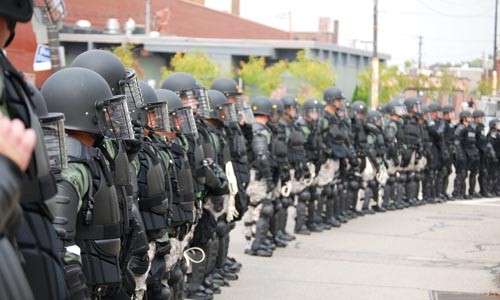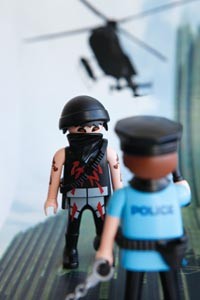
It's hard to remember now, but in the weeks leading up to last September's G-20 summit, officials warned that as many as 10,000 protesters might descend on Pittsburgh. Any number of them, breathless media accounts fretted, might come with feces to fling at police, or worse.
In the end, the vandalism was on par with a Super Bowl celebration. No feces was flung, no protesters were killed. (Click here to catch up with "Bike Girl" and others who'd been in the streets.) The city got an estimated $100 million worth of free advertising. (Compare our experience with Toronto's G-20 summit this year.)
That's the good news.
But things have been going downhill ever since -- largely due to criticism that city officials went too far in keeping the lid on. Within the next two weeks, attorneys with the American Civil Liberties Union and the firm Healy & Hornack will file what may be the most sweeping lawsuit to arise from the G-20.
The suit will be filed on behalf of those arrested Sept. 25 outside the Cathedral of Learning. Those arrests, which happened after the summit had formally ended, have long been controversial. Police had been harrying protesters from all over Oakland, and then carried out mass arrests of those encircled on the Cathedral lawn -- even of those who'd merely been caught up in the sweep. (Pitt students, meanwhile, have been trying to get on with their lives.) Among the arrestees were students, a Pittsburgh Post-Gazette reporter and Peter Shell, a longtime activist.
"I really hope that accountability comes out of this suit," says Shell, whose charges were later dismissed. "We need to find out the truth about what happened. The world leaders were gone, so why were these police there? Who made those plans? That to me is the biggest thing."
But it may also be the hardest thing to find out.
Other G-20 courtroom dramas have been grinding on for months. (Catch up on the legal status of arresstees here.) A federal civil-rights suit, also spearheaded by the ACLU, alleges that the city deliberately harassed the Seeds of Peace collective, whose members hoped to feed other demonstrators, but were chased by police all across the city. Meanwhile, the Citizens Police Review Board is looking into "policies, procedures, planning, training, supervision [and] deployment" related to G-20 security.
In both cases, the city has fought requests for information at almost every stage.
In the Seeds of Peace case, the city has fought numerous "discovery" requests, demands for information made prior to a trial. So far, its efforts have failed to sway judges -- a federal appeals court rejected the city's claims this month. But as a result, the case is "definitely on a slow track," says attorney Glen Downey, of Healy & Hornack.
The review board, meanwhile, is seeking to have police Chief Nate Harper charged with contempt for turning over heavily redacted records. Attorneys representing Harper have called the contempt filing an effort to "sensationalize and dramatize a routine discovery dispute." But the city too is taking a scorched-earth approach in court, making arguments before Judge Stanton Wettick that could hamper the review board in other investigations as well.
Attorneys for the city are now arguing, for example, that they can't release complete G-20 arrest records because of confidentiality laws covering arrestees. That flies in the face of a decade-long precedent, says review board Executive Director Beth Pittinger. "Since 1999, the city has agreed to turn these documents over to us. They are undoing everything previous administrations have done. The issue is much bigger than the G-20."
The city's response? "Past conduct does not compel repetition simply because the [board] reaps the ultimate advantage," filings tartly contend.
The review board isn't the only agency being buffeted in the G-20's wake. City councilors defer to Mayor Luke Ravenstahl's administration more often now than they did when the summit was going on.
Prior to the G-20, for example, council rejected a proposed ban on wearing masks and hoods in public, fearing the mayor's proposal might infringe on activists' free-speech rights. In June, by contrast, council passed a resolution urging Pittinger's board to back off, due to "concerns" about "financial exposure" from lawsuits those activists might file.
Council urged the board to delay investigating until the statute of limitations on G-20 lawsuits expired -- which plaintiff's attorney Downey says would take another year -- or until discovery gets underway in those cases. Given the city's aggressive legal posture, that could take many months as well.
While the city paid $3 million for an insurance policy to cover G-20 lawsuits, city lawyers have privately warned that the city could forfeit its coverage if the review board, a city agency, furnishes information that helps plaintiffs.
Echoing fears other officials have voiced to City Paper, city Councilor Theresa Smith told the Pittsburgh Tribune-Review in June that if the coverage was lost, "We could lose our homes over this."
Legal experts say that's unlikely. While government officials can be sued personally for civil-rights violations, it is "extraordinarily far-fetched that council members will be held liable," says Joseph Mistick, a Duquesne University law professor.
But shortly after passing the resolution, a council majority and Ravenstahl replaced five of seven review-board members, who'd been serving expired terms. The impact of that is unclear: At a June meeting, new board members assured council that no one had urged them to call off the G-20 inquiry, and the new board's first meeting is Sept. 28.
For now, the lawsuits continue. In August, Point Breeze resident Frank Beal filed a federal civil-rights suit stemming from his Sept. 24 arrest in Oakland. The suit alleges that although Beal complied with a police demand to disperse, police attacked him with pepper spray, and "viciously" struck his right knee -- which later required surgery -- with batons. While the accused officers were on loan from Harrisburg, the suit argues that Pittsburgh failed to properly train them, thus allowing officers to "use whatever level of force they ... wished to inflict."
"People are going to file lawsuits regardless" of what the city does, Downey predicts. The question is how much the fear of those lawsuits reshapes city institutions. Until we find out, it will take years before we know how the G-20 really changed Pittsburgh.



















